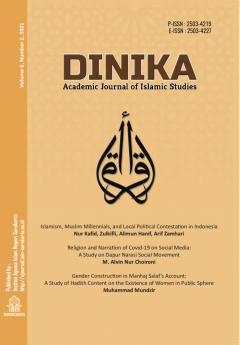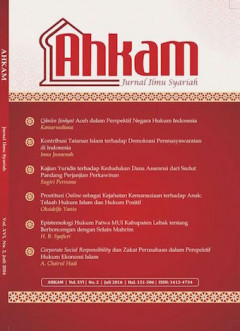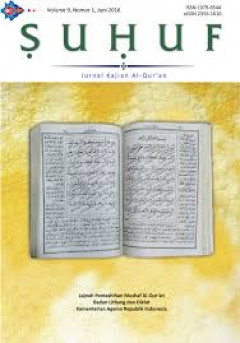Ditapis dengan

Reading a Feminist Response on "The Book of Knowledge" based on Gadamer's Phi…
The position of woman and knowledge in Islamic perspective has been an interesting issue in Islamic studies. One of the female Muslim scholars who focus her studies on feminism is Sa’diyya Shaikh. By exploring Gadamer’s philosophical hermeneutics, this paper is aimed at explaining the basic concepts of the philosophical hermeneutics of Sa’diyya Shaikh’s “Knowledge, Wom…
- Edisi
- Dinika, Vol. 2 No. 2 May-Agustus (2017)
- ISBN/ISSN
- 2503-4219
- Deskripsi Fisik
- Hal 167-184. 30 cm
- Judul Seri
- -
- No. Panggil
- J 297.77 Din

Kritik Hermeneutik dan Kontekstualisasi Ayat-Ayat Hukum Kritik Hermeneutik…
Hermeneutics is often suspected as 'not from the Islamic treasury'. Although the topic of interpretation has been introduced by Aristotle in“ On Interpretation,” Hermeneutics became an independent subject in the science of philosophy in the seventeenth century mainly related to theinterpretation of texts and literary works. Another suspicion of the presence of Hermeneutics in Islamic treasu…
- Edisi
- Ahkam Vol 17, No 1, 2017
- ISBN/ISSN
- 24078646
- Deskripsi Fisik
- ii ,10 hlm, 24 cm
- Judul Seri
- -
- No. Panggil
- J 297.272 Ahk

Through the Lens of Gadamer’s Hermeneutics: In comparison between Amina Wad…
Most of traditional Muslim exegetes interpret Q. 4:34 in terms of maintaining the superiority of men over women. Some progressive Muslim scholars then insist a contextual approach to the verse to criticize gender inequality. Among some progressive Muslim scholars, this article comparatively examines the interpretations of Amina Wadud and Mohammed Talbi of Q. 4:34. Although both of them propose …
- Edisi
- Suhuf ,Vol 1, Tahun XI,Mei 2017
- ISBN/ISSN
- 19796544
- Deskripsi Fisik
- ii ,10 hlm, 24 cm
- Judul Seri
- -
- No. Panggil
- J 297.1 Suh

Jurnal : Peta Fiqh Mu'asir Muslim Progresif.
Many contemporary Muslim scholars argue that Islamic jurisprudence (fiqh) is not ready to face the demands of the modern era. Modernity it so powerful that it weakens the foundation of fiqh on the ane hand, and opens up new opportunities that cannot be reached by fiqh on the other. The method that fiqh has introduced is in itself incapable of addressing new issues such as the issue of humam rig…
- Edisi
- Islamica. V. 7, N. 1, Sep 2012. h. 61-84
- ISBN/ISSN
- ISSN 1978-3183
- Deskripsi Fisik
- -
- Judul Seri
- -
- No. Panggil
- J. 2X7.4/4 Isl.

Usul al fiqh versus hermeneutika tentang pengembangan pemikiran hukum Islam k…
The philosophy of Islamic Law [ushul al fiqh] has been known as occupying the central position in the whole structure of Islamic jurisprudence. Its method and logic of legal extrapolation has dominated not only the legal sphere of the jurists but also influenced the philosophers and the scholastics in their method and way of thinking. Ushul al fiqh is mainly deductive in its approach and is con…
- Edisi
- Islamica4, Nomor 2, Maret 2010194-210
- ISBN/ISSN
- -
- Deskripsi Fisik
- -
- Judul Seri
- -
- No. Panggil
- J 2X7.4/4 Isl
 Karya Umum
Karya Umum  Filsafat
Filsafat  Agama
Agama  Ilmu-ilmu Sosial
Ilmu-ilmu Sosial  Bahasa
Bahasa  Ilmu-ilmu Murni
Ilmu-ilmu Murni  Ilmu-ilmu Terapan
Ilmu-ilmu Terapan  Kesenian, Hiburan, dan Olahraga
Kesenian, Hiburan, dan Olahraga  Kesusastraan
Kesusastraan  Geografi dan Sejarah
Geografi dan Sejarah